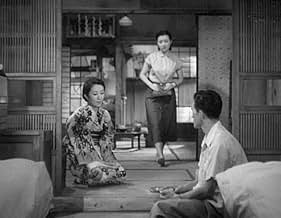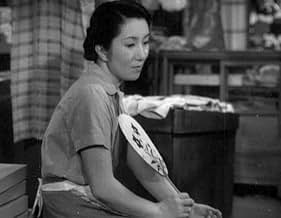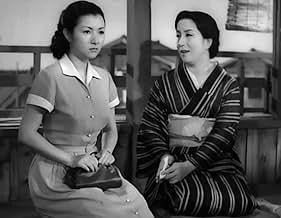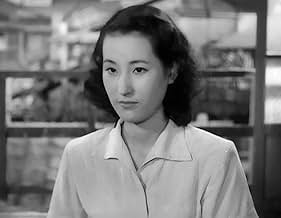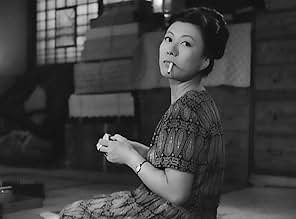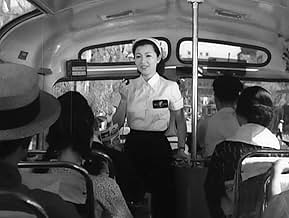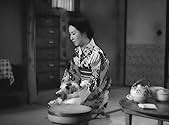Ajouter une intrigue dans votre languePoor, pathetic mother Ose has four children, three daughters and a son, by four different men.Poor, pathetic mother Ose has four children, three daughters and a son, by four different men.Poor, pathetic mother Ose has four children, three daughters and a son, by four different men.
- Réalisation
- Scénario
- Casting principal
- Récompenses
- 5 victoires au total
Eitarô Ozawa
- Tsunakichi
- (as Sakae Ozawa)
Avis à la une
In the same category as the superb HAPPINESS FOR US ALONE, though not in the same class. Both films deal in earthy detail with lives of working (and sometime not working) poor in post WWII Tokyo, in a manner which is consistently level-headed, neither sensational or sentimental, but still managing to be engrossing entertainment, even enthralling.
And, most importantly for this reviewer, both star the luminous Hideko Takamine. This adorable and beautiful lead actress had a very busy career, and her expressive face is a joy to watch.
INAZUMA is essentially a high-quality soap opera. Told mainly from Kiyoko's (youngest daughter, aged 23) point of view, the story mainly concerns an old woman who had four offspring, each from different fathers. Nearly everyone is a highly fallible human being, and you sometimes want to grab these characters, shake them and yell "stop being so damn stupid !".
That curious old Hollywood term "woman's picture" also comes to mind, as the strongest characters are all women, as does "slice of life", because the story has no proper start and end points.
If all this makes it sound dull and lacking focus, it isn't. This is a wonderful film in every possible way. The direction and acting are first class, and the characters all too believeable and probably very much like many other people you know. In a way, comparison with HFUA is unfair, as HFUA is a strong candidate for one of the best Japanese films ever made, but INAZUMA still rates a strong mention.
Highly recommended.
And, most importantly for this reviewer, both star the luminous Hideko Takamine. This adorable and beautiful lead actress had a very busy career, and her expressive face is a joy to watch.
INAZUMA is essentially a high-quality soap opera. Told mainly from Kiyoko's (youngest daughter, aged 23) point of view, the story mainly concerns an old woman who had four offspring, each from different fathers. Nearly everyone is a highly fallible human being, and you sometimes want to grab these characters, shake them and yell "stop being so damn stupid !".
That curious old Hollywood term "woman's picture" also comes to mind, as the strongest characters are all women, as does "slice of life", because the story has no proper start and end points.
If all this makes it sound dull and lacking focus, it isn't. This is a wonderful film in every possible way. The direction and acting are first class, and the characters all too believeable and probably very much like many other people you know. In a way, comparison with HFUA is unfair, as HFUA is a strong candidate for one of the best Japanese films ever made, but INAZUMA still rates a strong mention.
Highly recommended.
When a retrospective of films directed by Mikio Naruse played in my area a short while ago, I saw quite a few of them in a short span of time, including many of the ones considered classics -- "Repast," "Floating Clouds," "When a Woman Ascends the Stairs," and so on. While I enjoyed them all, some of the plots and characters of the films became muddled in my mind because of the compressed time frame in which I saw them.
Yet parts of this family drama, "Inazuma" ("Lightning"), keep coming back to me months afterward. I think it's because the story resonates so closely with my experience -- that of a young adult trying to make his or her way in the world while struggling with the simultaneous tug and repulsion of one's blood relations. The movie realistically portrays the frustration and misery that can occur within a family under adverse circumstances. But it contains a tinge of hopefulness as well.
Most of us, at one time or another, have become disgusted with members of our family and have felt like running away from them rather than dealing with them and their attendant obligations. "Familiarity breeds contempt," the saying goes. At such times we might even feel more comfortable associating with strangers than with our own kin. That pretty well describes the feelings of Hideko Takamine's character, Kiyoko, during this film. She is the youngest of four adult siblings, each fathered by a different man by their now graying, hapless mother. As the story progresses, Kiyoko becomes increasingly frustrated at her flawed siblings and their constant bickering, begging, and self-pity until she decides she just can't stand them anymore and moves across town in search of a more tranquil domestic life. And for a while she seems to find it.
This probably doesn't sound like a pleasant film to watch, and indeed much of the movie is one agonizing episode after another for Kiyoko. But these episodes often play out in humorous fashion. And the sublime conclusion makes this film especially memorable. Without being too specific, I will say that the ending sequence, in which Kiyoko and her mother have it out with each other, is a masterfully filmed composition of acting, dialogue, and music. It's stirring on many levels. One part of that scene, in which Takamine gazes out her window to the house next door, keeps returning to my mind week after week.
"Lightning" is an emotionally true and ultimately quite satisfying portrayal of an young woman's search for personal happiness in the midst of familial conflict. Much of the credit should go to Takamine's expressive acting, Naruse's skillful intercutting, and Fumiko Hayashi's deftly written story. This is the second of Naruse's films based on stories by Hayashi ("Meshi," a.k.a. "Repast," was the first), and fortunately there would be four more: "Tsuma" ("Wife"), "Bangiku" ("Late Chrysanthemums"), "Ukigumo" ("Floating Clouds"), and "Hourou-ki" ("A Wanderer's Notebook"). I haven't seen "Wife," but the others are all worth seeing, in my opinion. For now, though, "Lightning" is the one I regard with the most affection.
Yet parts of this family drama, "Inazuma" ("Lightning"), keep coming back to me months afterward. I think it's because the story resonates so closely with my experience -- that of a young adult trying to make his or her way in the world while struggling with the simultaneous tug and repulsion of one's blood relations. The movie realistically portrays the frustration and misery that can occur within a family under adverse circumstances. But it contains a tinge of hopefulness as well.
Most of us, at one time or another, have become disgusted with members of our family and have felt like running away from them rather than dealing with them and their attendant obligations. "Familiarity breeds contempt," the saying goes. At such times we might even feel more comfortable associating with strangers than with our own kin. That pretty well describes the feelings of Hideko Takamine's character, Kiyoko, during this film. She is the youngest of four adult siblings, each fathered by a different man by their now graying, hapless mother. As the story progresses, Kiyoko becomes increasingly frustrated at her flawed siblings and their constant bickering, begging, and self-pity until she decides she just can't stand them anymore and moves across town in search of a more tranquil domestic life. And for a while she seems to find it.
This probably doesn't sound like a pleasant film to watch, and indeed much of the movie is one agonizing episode after another for Kiyoko. But these episodes often play out in humorous fashion. And the sublime conclusion makes this film especially memorable. Without being too specific, I will say that the ending sequence, in which Kiyoko and her mother have it out with each other, is a masterfully filmed composition of acting, dialogue, and music. It's stirring on many levels. One part of that scene, in which Takamine gazes out her window to the house next door, keeps returning to my mind week after week.
"Lightning" is an emotionally true and ultimately quite satisfying portrayal of an young woman's search for personal happiness in the midst of familial conflict. Much of the credit should go to Takamine's expressive acting, Naruse's skillful intercutting, and Fumiko Hayashi's deftly written story. This is the second of Naruse's films based on stories by Hayashi ("Meshi," a.k.a. "Repast," was the first), and fortunately there would be four more: "Tsuma" ("Wife"), "Bangiku" ("Late Chrysanthemums"), "Ukigumo" ("Floating Clouds"), and "Hourou-ki" ("A Wanderer's Notebook"). I haven't seen "Wife," but the others are all worth seeing, in my opinion. For now, though, "Lightning" is the one I regard with the most affection.
Kumeko Urabe has four daughters and one son, each by a different father. The son is a layabout who keeps saying "Next year...." The daughters are hardworking, and the three eldest are married. The youngest is Hideko Takamine. She has a job as a conductress on a tour bus. Her family keeps trying to get her to marry Eitarô Ozawa. She looks at her sisters and their unhappy marriages, the squabbling, the drunken men. She does not want to get married. She wants out. One day, it strikes her like a lightning bolt that she can leave, and she vanishes from her family.
Mikio Naruse directs this movie from a novel by Fumiko Hayashi and it's a real shocker to anyone who looks at the gentle family comedies of Ozu, where loving and successful parents nudge their loving children towards the right outcome. What happens when nothing works? What do you do when you do everything right -- well, most things -- and everyone around you fouls up? You work hard, you live thriftily, you keep your mouth shut because no one listens -- like Miss Takamine in this movie, I am a youngest child, and that's the way it is -- and watch as others act like idiots, as if there are no consequences, and then listen to them chatter drunkenly about their bad luck.... and ask you to pick up the bar bill. Like a dope, you do.
There's no disputing Naruse's abilities as a film maker, and no disputing Miss Takamine's as an actress. The two of them could turn out a very good movie whenever they worked together. Every once in a while, they hit the right subject, and this movie speaks to me like a thunderclap.
Mikio Naruse directs this movie from a novel by Fumiko Hayashi and it's a real shocker to anyone who looks at the gentle family comedies of Ozu, where loving and successful parents nudge their loving children towards the right outcome. What happens when nothing works? What do you do when you do everything right -- well, most things -- and everyone around you fouls up? You work hard, you live thriftily, you keep your mouth shut because no one listens -- like Miss Takamine in this movie, I am a youngest child, and that's the way it is -- and watch as others act like idiots, as if there are no consequences, and then listen to them chatter drunkenly about their bad luck.... and ask you to pick up the bar bill. Like a dope, you do.
There's no disputing Naruse's abilities as a film maker, and no disputing Miss Takamine's as an actress. The two of them could turn out a very good movie whenever they worked together. Every once in a while, they hit the right subject, and this movie speaks to me like a thunderclap.
10Andy-296
Inazuma stars the wonderful Hideko Takamine, which was one of the regulars of the films of Michio Naruse (at least during the 1950s). The movie, set in postwar Japan in a lower middle class milieu, is a bit hard to understand at first, with all the messy family relations for the audience to sort out, but is basically about the Takamine character's decision to leave her extended family and start a life of her own (her mother has four different children from different fathers: "you breed like a cat", Takamine would later reproach her mother, in one of the movie's funnier lines). The movie ends up in a relatively upbeat note. And why in so many Japanese movies from the 1950s the only job apparently available to young women consist on being tourist guides?
This is about a fairly dysfunctional family: multiple fathers who seem to have left the scene and bickering adult siblings with problems. I scored this a bit low because I wasn't sure what was going on. One could see the big picture of sis trying to get out from under but otherwise, it seemed a mishmash of interactions which were fairly predictable and didn't take the plot anywhere.
It's well-shot and edited; Naruse always is; but without any evident direction, it's hard to stay engaged. I'm afraid I nodded off a bit, so perhaps I missed something, but it wasn't easy to stay focused when nothing much was happening. What there was was crashing great points without much subtlety; unusual for Naruse.
It's well-shot and edited; Naruse always is; but without any evident direction, it's hard to stay engaged. I'm afraid I nodded off a bit, so perhaps I missed something, but it wasn't easy to stay focused when nothing much was happening. What there was was crashing great points without much subtlety; unusual for Naruse.
Meilleurs choix
Connectez-vous pour évaluer et suivre la liste de favoris afin de recevoir des recommandations personnalisées
Détails
- Date de sortie
- Pays d’origine
- Langue
- Aussi connu sous le nom de
- Lightning
- Lieux de tournage
- Société de production
- Voir plus de crédits d'entreprise sur IMDbPro
- Durée1 heure 27 minutes
- Couleur
- Mixage
- Rapport de forme
- 1.37 : 1
Contribuer à cette page
Suggérer une modification ou ajouter du contenu manquant


